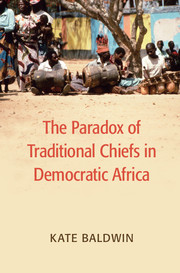Book contents
- Frontmatter
- Dedication
- Contents
- List of Figures
- List of Tables
- Acknowledgments
- PART I TOWARD A NEW THEORY OF CHIEFS
- 1 The Paradox of Chiefs
- 2 Conceptualizing Chiefs
- 3 Traditional Leaders and Democracy
- 4 Chiefs as Development Brokers
- PART II CHIEFS, DEVELOPMENT, AND ELECTIONS IN ZAMBIA
- PART III TRADITIONAL LEADERS IN AFRICA AND BEYOND
- Appendix A Cross-National Data Set of Chiefs' Power
- Appendix B List of Interviews and Interview Protocols
- Appendix C Data Set on Local Public Goods and Chiefs
- Appendix D Survey of Chiefs and Chiefdom-Level Data Set
- Appendix E Household Survey and Experiment
- References
- Index
- Books in the Series
4 - Chiefs as Development Brokers
from PART I - TOWARD A NEW THEORY OF CHIEFS
Published online by Cambridge University Press: 05 November 2015
- Frontmatter
- Dedication
- Contents
- List of Figures
- List of Tables
- Acknowledgments
- PART I TOWARD A NEW THEORY OF CHIEFS
- 1 The Paradox of Chiefs
- 2 Conceptualizing Chiefs
- 3 Traditional Leaders and Democracy
- 4 Chiefs as Development Brokers
- PART II CHIEFS, DEVELOPMENT, AND ELECTIONS IN ZAMBIA
- PART III TRADITIONAL LEADERS IN AFRICA AND BEYOND
- Appendix A Cross-National Data Set of Chiefs' Power
- Appendix B List of Interviews and Interview Protocols
- Appendix C Data Set on Local Public Goods and Chiefs
- Appendix D Survey of Chiefs and Chiefdom-Level Data Set
- Appendix E Household Survey and Experiment
- References
- Index
- Books in the Series
Summary
This chapter offers a new theory of the role of traditional chiefs in democratic Africa. In contrast to the common claim that chiefs undermine accountability by disconnecting citizens from their elected representatives, this theory claims that unelected traditional chiefs can facilitate the responsiveness of politicians to their constituents.
The claim is not due to a romanticized notion of traditional institutions in Africa. As Chapter 2 demonstrated, in most cases, traditional governance institutions cannot be viewed as protodemocratic. Traditional leaders typically inherit their positions, have limited institutional checks on their decision-making power, and operate in settings where there are limited opportunities for popular participation in decision making. Yet, following the introduction of national elections, traditional chiefs often play a positive role in facilitating the responsiveness of politicians to their constituents. How can this be?
As outlined in Chapter 3, elections force politicians to try to win votes from rural voters, who still make up electoral majorities in most of Africa. To win votes, politicians must respond to voters' demands. As I will demonstrate later, these are typically for basic infrastructure and social services. However, given the weakness of the states' bureaucratic institutions, politicians have difficulty responding to their constituents through these processes.
This is where unelected traditional chiefs can have a paradoxically positive effect on democratic responsiveness. To deliver public goods and services to rural constituencies, politicians need help from established local-level institutions. The fact that traditional leaders are not elected is not just coincidental to their role in facilitating government responsiveness; it gives them a permanence in their communities, both as individual leaders and as an institution, that uniquely positions them to facilitate the delivery of development projects.
Thus I argue that the primary role of traditional chiefs in democratic Africa is brokering development projects, not votes, with any political influence they maintain derived from this function. By recognizing chiefs' potentially constructive role in facilitating local development projects, this model also forces a reappraisal of their political influence. If the delivery of resources to a voter's community depends on elected representatives working with local traditional chiefs, it makes good sense that voters may consider their chiefs' opinion of each candidate when deciding who to support.
- Type
- Chapter
- Information
- The Paradox of Traditional Chiefs in Democratic Africa , pp. 65 - 82Publisher: Cambridge University PressPrint publication year: 2015

